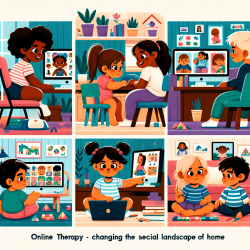As practitioners in the field of speech therapy and special education, the effectiveness of our interventions is deeply intertwined with our ability to communicate. The research presented in "Interpersonal Communication: Concepts, Components and Contents (Second Edition)" offers invaluable insights into the complex dynamics of communication that can significantly enhance our therapeutic practices. By delving into the components and processes of effective communication, we can improve not only our therapeutic outcomes but also our relationships with students, clients, and colleagues.
Understanding the Components of Communication
At the heart of effective therapy lies the ability to convey intentions, emotions, and information in a manner that is both comprehensible and empathetic. The research highlights the importance of understanding the various components of communication, including verbal and non-verbal cues, the context of the interaction, and the perceptual filters through which our messages are received. By becoming more attuned to these components, therapists can tailor their communication strategies to meet the unique needs of each client.
Enhancing Verbal Expressiveness
Verbal expressiveness is a critical skill for therapists, enabling us to articulate thoughts and instructions clearly and persuasively. The research underscores the power of language in shaping our interactions and the importance of choosing our words carefully to foster understanding and rapport. Strategies such as using simple, concrete language or employing metaphors and stories can enhance our expressiveness and make our messages more relatable and impactful.
Mastering Non-Verbal Communication
Non-verbal cues, such as facial expressions, gestures, and tone of voice, play a pivotal role in communication. They can reinforce our verbal messages, convey empathy, and establish a connection with our clients. The research encourages therapists to be mindful of their own non-verbal signals and to interpret those of their clients accurately. By doing so, we can create a more supportive and encouraging therapeutic environment.
Active Listening and Empathy
Active listening and empathy are foundational to successful therapy. These skills enable us to understand our clients' perspectives, validate their feelings, and respond in ways that promote trust and openness. The research provides practical tips for enhancing these skills, such as maintaining eye contact, paraphrasing to ensure understanding, and expressing empathy through both verbal and non-verbal means.
Adapting to Different Communication Styles
Each individual has a unique communication style influenced by their personality, cultural background, and personal experiences. The research highlights the importance of adapting our communication approach to align with the preferences and needs of our clients. By being flexible and responsive to different styles, we can improve our effectiveness as therapists and foster stronger therapeutic alliances.
Overcoming Communication Barriers
Barriers to effective communication, such as misunderstandings, resistance, or emotional distress, can hinder therapeutic progress. The research offers strategies for identifying and overcoming these barriers, such as clarifying intentions, addressing concerns directly, and employing active listening to defuse tension. By navigating these challenges skillfully, we can maintain a positive and productive therapeutic relationship.
Continuous Learning and Improvement
Finally, the research emphasizes the importance of ongoing learning and self-reflection in developing our communication skills. By seeking feedback, engaging in professional development opportunities, and reflecting on our interactions, we can continually refine our abilities and enhance our therapeutic impact.
In conclusion, the insights from "Interpersonal Communication: Concepts, Components and Contents (Second Edition)" provide a rich framework for enhancing our communication skills in therapeutic settings. By applying these principles, we can improve our ability to connect with, support, and empower our clients, leading to more effective interventions and positive outcomes. To read the original research paper, please follow this link: Interpersonal Communication: Concepts, Components and Contents (Second Edition).










